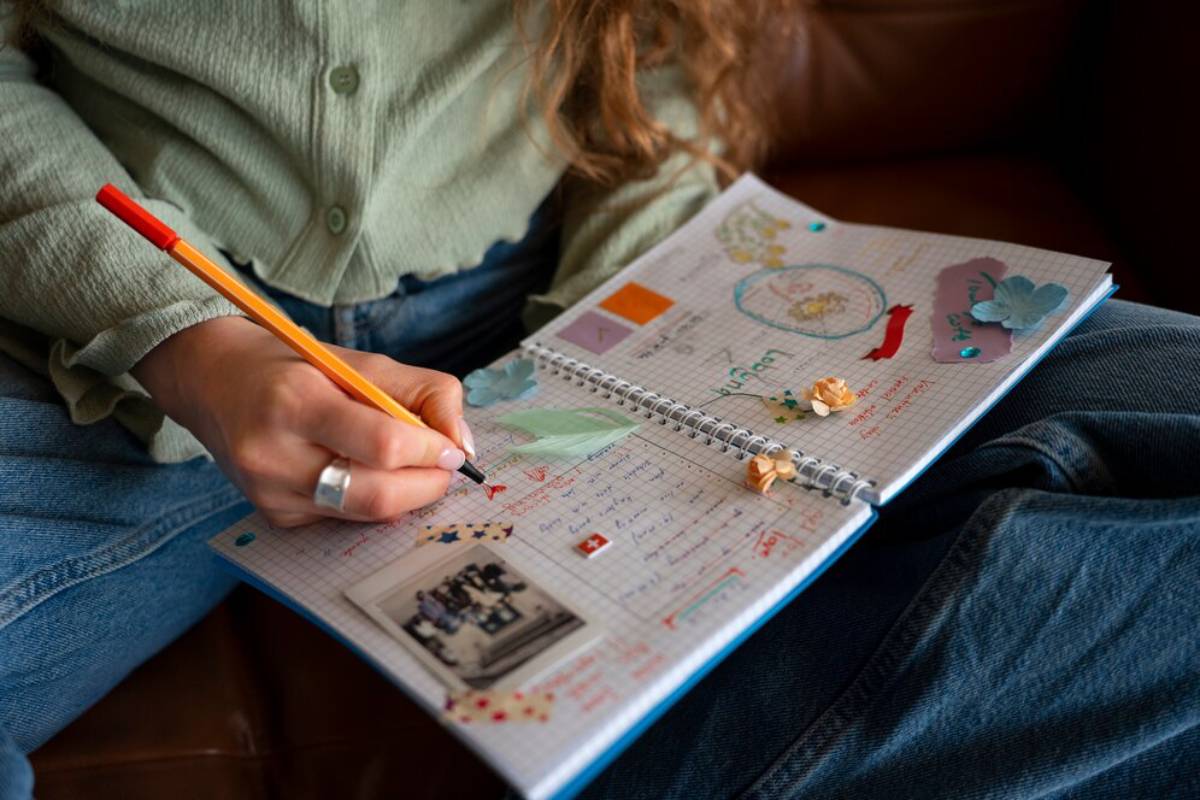
How Reflective Journaling Builds Self-Awareness
Reflective journaling has become popular lately. It greatly helps with personal growth and can be a powerful way to reflect on yourself in our fast-paced world. This blog looks at the many benefits of reflective journaling. It focuses on building self-awareness and offers tips on how to use this powerful tool in your daily life.
Reflective journaling goes beyond writing. It lets you explore your thoughts and feelings deeply. This practice offers a calm space for reflection and growth in our distracting world. Reflective journaling is very important. It helps boost self-awareness, mental clarity, and emotional well-being. This practice helps people know themselves better. It shows their role in the world.
The Importance of Reflective Journaling
Reflective journaling is key to self-reflection. It helps people explore their thoughts, feelings, and experiences in an organised way. This process improves mental clarity and makes you feel more mindful and present. Journaling helps people spot their behaviour patterns. It also shows where they can improve and allows them to celebrate their achievements. Reflective journaling is a strong tool for personal growth and development.
A Compelling Hook: The Power of Self-Discovery
Picture a world where you truly grasp your feelings, drives, and dreams. Reflective journaling offers this possibility by providing a safe space for self-exploration. Regular journaling helps people discover themselves and build self-awareness. This practice boosts personal insight. It helps people make informed decisions and live happier lives.
Addressing Common Misconceptions
Despite its numerous benefits, reflective journaling is often misunderstood. Some people see journaling as a waste of time, and others might feel scared to write down their deepest thoughts. Reflective journaling is personal and flexible. You can adjust it to fit your preferences and needs. Clearing up misunderstandings helps people see journaling as a useful tool. It boosts self-awareness and supports personal growth.
Key Benefits
Reflective journaling has many benefits for personal growth and self-awareness. Engaging in this practice helps individuals understand themselves better. This can lead to clearer thinking and better emotional health.
Enhancing Self-Awareness
One of the primary benefits of reflective journaling is the enhancement of self-awareness. Keeping a journal helps people understand their behaviour and emotions better. This awareness allows people spot areas where they can grow. It leads to better decision-making and personal empowerment.
Promoting Mental Clarity
Reflective journaling is a powerful tool for promoting mental clarity. Writing down thoughts and feelings helps people better understand their experiences. This process boosts cognitive function and clears mental clutter, improving focus and concentration.
Fostering Emotional Well-being
Journaling benefits extend beyond mental clarity to encompass emotional well-being. Reflective journaling creates a safe space for self-expression. It helps people process and release emotions in a healthy way. This practice can lower stress, anxiety, and depression, helping create better emotional balance and resilience.

Real-Life Applications and Data-Backed Insights
Well-researched, reflective journaling greatly affects personal growth and well-being. Research shows that people who journal often have more self-awareness. They also enjoy better mental health and improved emotional control. These findings highlight how reflective journaling can help with personal growth and self-discovery.
Additional Expert Tips & Common Mistakes to Avoid
Be intentional and mindful when you reflect in your journal. This will help you get the most out of your practice. Use expert tips and avoid common mistakes to improve your journaling. This can help you gain more self-awareness.
Best Practices for Reflective Journaling
- Set Clear Intentions: Before you begin journaling, take a moment to think about your goals. You could look at a certain feeling, think about a recent event, or understand something about your life.
- Find a Quiet Space: Pick a calm and cosy spot. This will help you focus on your journaling without interruptions, allowing you to be present and engaged in the process.
- Be Honest and Authentic: Reflective journaling is personal. So, it’s key to be honest and authentic in your writing. Allow yourself to express your true thoughts and emotions without judgment or censorship.
- Practice Regularly: Consistency is key to reflective journaling. Journal regularly, whether daily, weekly, or monthly. This will help you keep momentum and boost your self-awareness.
Common Mistakes and Misconceptions
- Perfectionism: Don’t fall into the perfectionism trap. Remember, your journal doesn’t need to be perfect. Focus on the process of self-reflection rather than the quality of your writing.
- Overthinking: Journaling is excellent for exploring yourself. Just be careful not to overthink or overthink your thoughts. Allow yourself to write freely and intuitively without getting bogged down in analysis.
- Neglecting Self-Care: Reflective journaling can stir up tough feelings. It’s essential to focus on self-care and get support if needed. Remember to be gentle with yourself and take breaks when necessary.
Advanced Insights
To improve your reflective journaling, add expert tips and deeper insights. These strategies can deepen your self-awareness and enrich your journaling experience.

Exploring Different Journaling Techniques
- Prompt-Based Journaling: Use prompts to inspire your thoughts. They help you think deeply about specific themes or topics. This helps organise your writing. It also encourages you to explore your thoughts and feelings more deeply.
- Mind Mapping: Mind mapping is a visual tool. It helps you organize and connect your thoughts creatively and intuitively. This approach can enhance mental clarity and stimulate new insights.
- Gratitude Journaling: Writing what you’re thankful for can boost your mood and improve your emotional health. Reflect on what you’re grateful for. Think about how these things boost your happiness.
Unique Industry Perspectives
Many people in different industries use reflective journaling. Journaling helps everyone, from artists to executives. It’s an excellent tool for boosting creativity, solving problems, and growing personally. Exploring different industry views can inspire people. It shows how journaling improves both work and personal life.
Conclusion: How Reflective Journaling Builds Self-Awareness
Reflective journaling is a powerful practice. It helps boost self-awareness, mental clarity, and emotional well-being. Journaling regularly helps people understand themselves better. This can lead to personal growth and empowerment.
Key Takeaways:
- Reflective journaling enhances self-awareness by providing insight into thoughts, emotions, and behaviour patterns.
- Journaling helps clear your mind. It organises your thoughts, which boosts focus and concentration.
- This practice boosts emotional well-being. It offers a safe space for expressing feelings and processing emotions.
Encouraging Next Steps:
Consider incorporating reflective journaling into your daily routine if you haven’t already. Start small by dedicating a few minutes daily to jotting down your thoughts and feelings. This practice can be a key tool for self-discovery and personal growth with time.
Thought-Provoking Statement
Reflective journaling is more than a practice. It’s a journey to self-awareness and change. What insights and discoveries await you on this journey? The power to unlock your true potential lies within your hands—and your pen.